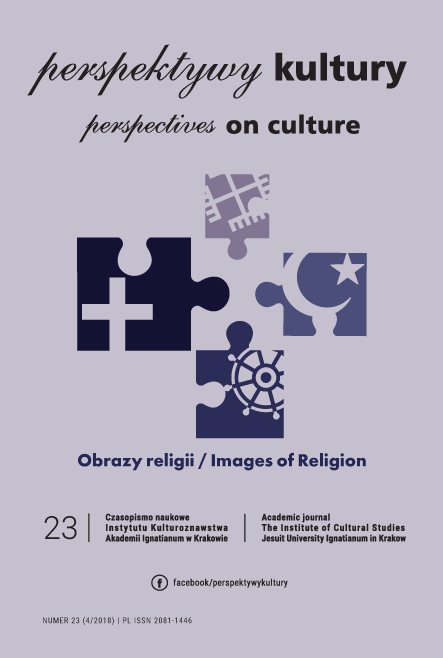Religion as a source of European identity. A few remarks on the margin of the contemporary debate
Abstract
Nowadays, the culture-forming role of Christianity is increasingly being questioned. The fact that it was one of the pillars on which Europe was built is questioned, and even a thesis is being formulated about its harmful influence on the functioning of Western culture. There are also opinions that the Western civilisation built on the foundation of Christianity does not meet the expectations of contemporary man. As a result, models for its profound modifications are being sought in the Enlightenment era as well as in the ideas of liberalism and Marxism.
Since, apart from the Catholic Church, there are many Protestant communities in Europe today, talking about the ‘Christian roots of Europe’ can lead to misunderstandings. Therefore, in the first part of the article, I show that the most important source of ideas shaping Europe and its culture was the doctrine of the Catholic Church. Then, referring to the views of professor Zofia J. Zdybicka, I present philosophical arguments justifying the thesis that religion is indeed the foundation of every culture. I also show, recalling published works of Joseph Ratzinger, that without the culture-forming activity of the Catholic Church there would be no Europe – at least in the form as we know it. The article ends with a list of the most important cultural consequences of attempts to deprive contemporary European culture of its religious roots.
References
BELLOC Hilaire. 2017. Herezja reformacji. Kraków: Wydawnictwo AA.
BELLOC Hilaire. 2018. Mity i fakty o historii Kościoła. Kraków: Wydawnictwo AA.
BELLOC Hilaire. 2016. Wielkie herezje. Kraków: Wydawnictwo AA.
BUTTIGLIONE Rocco. 1996. Europa jako pojęcie filozoficzne. Lublin: TN KUL.
DREHER Rod. 2018. Opcja Benedykta. Jak przetrwać czas neopogaństwa. Kraków: Wydawnictwo AA.
HUSSERL Edmund. 1993. Kryzys europejskiego człowieczeństwa a filozofia. Warszawa: Aletheia.
JAN PAWEŁ II. 2002. Europa zjednoczona w Chrystusie. wybór i oprac. L. Sosnowski i G. Turowski. Kraków: Biały Kruk.
MAZURKIEWICZ Piotr, PTASZEK Robert T., MŁYŃCZYK Łukasz. 2018.
Polityka wyznaniowa. Perspektywa Unii Europejskiej. Zielona Góra: Wydawnictwo Morpho.
MOSKAL Piotr. 2012. Apologia religii katolickiej. Lublin: Wydawnictwo KUL.
MOSKAL Piotr. 2012. Chrześcijaństwo jako religia logosu. W: Uniwersalizm chrześcijaństwa wobec alternatywnych propozycji współczesności. R.T. Ptaszek, M. Piwowarczyk (red.), Lublin: Wydawnictwo KUL.
PTASZEK Robert T. 2017. Zmierzch Europy? Perspektywy przyszłości a chrześcijaństwo. Warszawa–Radzymin: Wydawnictwo von borowiecky.
RATZINGER Joseph. 2005. Czas przemian w Europie. Miejsce Kościoła i świata. Kraków: Wydawnictwo M.
RATZINGER Joseph. 2005. Europa. Jej podwaliny dzisiaj i jutro. Kielce: Jedność.
RATZINGER Joseph. 1997. Sól ziemi. Chrześcijaństwo i Kościół katolicki na przełomie tysiącleci. Z kardynałem rozmawia Peter Seewald, Kraków: Znak.
RATZINGER Joseph. 2004. Wiara – prawda – tolerancja. Chrześcijaństwo a religie świata. Kielce: Wydawnictwo Jedność.
WOJTYŁA Karol. 1994. „Gdzie znajduje się granica Europy?”. Ethos 4 (28): 27-34.
WOODS Jr Thomas E. 2006. Jak Kościół katolicki zbudował zachodnią cywilizację. Kraków: Wydawnictwo AA.
ZDYBICKA Zofia J. 2006. Człowiek i religia. Lublin: Polskie Towarzystwo Tomasza z Akwinu.
ZDYBICKA Zofia J. 2010. Religia w kulturze, Lublin: Polskie Towarzystwo Tomasza z Akwinu.
Copyright (c) 2020 Perspectives on culture

This work is licensed under a Creative Commons Attribution-NoDerivatives 4.0 International License.
Autor, zgłaszając swój artykuł, wyraża zgodę na korzystanie przez Wydawnictwo Uniwersystet Ignatianum z utworu na następujących polach eksploatacji:
- utrwalania utworu w formie papierowej, a także na nośniku cyfrowym lub magnetycznym;
- zwielokrotnienia utworu dowolną techniką, bez ograniczenia ilości wydań i liczby egzemplarzy;
- rozpowszechniania utworu i jego zwielokrotnionych egzemplarzy na jakimkolwiek nośniku, w tym wprowadzenia do obrotu, sprzedaży, użyczenia, najmu;
- wprowadzenia utworu do pamięci komputera;
- rozpowszechniania utworu w sieciach informatycznych, w tym w sieci Internet;
- publicznego wykonania, wystawienia, wyświetlenia, odtworzenia oraz nadawania i reemitowania, a także publicznego udostępniania utworu w taki sposób, aby każdy mógł mieć do niego dostęp w miejscu i czasie przez siebie wybranym.
Wydawca zobowiązuje się szanować osobiste prawa autorskie do utworu.





